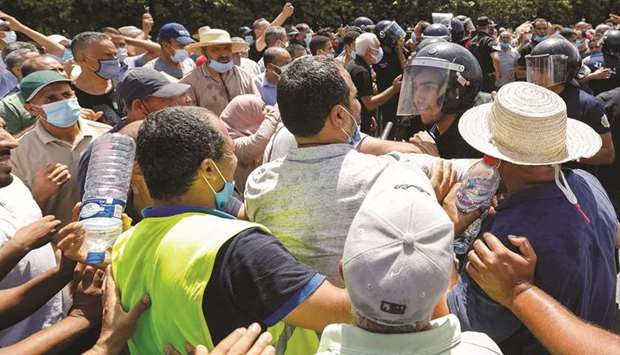Qatar said that it is following the developments of the political crisis in Tunisia, and called on all parties to uphold the interests of the Tunisian people, let the voice of wisdom prevail, and avoid escalation and its repercussions on Tunisia’s march and experience, which won respect at the regional and international levels.
In a statement yesterday, the Ministry of Foreign Affairs expressed Qatar’s hope that the Tunisian parties would follow the path of dialogue to overcome the crisis, consolidate the foundations of the state of institutions and establish the rule of law in the Republic of Tunisia.
The statement expressed Qatar’s hope for preserving the stability of Tunisia and achieving the aspirations and ambitions of its people for further progress and prosperity.
In a coup d’é·tat on Sunday, President Kais Saied dismissed the Prime Minister Hichem Mechichi and froze the activities of parliament, plunging the young democracy into constitutional crisis in the midst of a pandemic.
Parliament Speaker Rached Ghannouchi, head of the moderate Islamist Ennahda party which is the biggest in parliament, called the move a coup and urged Tunisians to come onto the streets against it. “Kais Saied is dragging the country into catastrophe,” he told Turkish television.
It “is a coup d’etat against the revolution and against the constitution,” said Ennahdha, the lead party in Tunisia’s fractious ruling coalition charged, warning its members “will defend the revolution”.
The next three largest parties, Heart of Tunisia, Attayar and Karama also rejected the move as a coup.
Street clashes erupted outside the army-barricaded parliament, after Saied ordered parliament closed for 30 days.
President Saied also sacked the defence minister yesterday.
A statement from the presidency announced the dismissals of Defence Minister Ibrahim Bartaji and acting justice minister Hasna Ben Slimane, who is also the government spokeswoman.
The United States has voiced alarm over the Tunisian president’s sacking of the government and called on the birthplace of the Arab Spring to adhere to “democratic principles.”
“We’re concerned about the developments in Tunisia,” White House Press Secretary Jen Psaki told reporters in Washington.
The United Nations called on all parties in Tunisia “to exercise restraint, refrain from violence and ensure that the situation remains calm,” a spokesperson for UN Secretary-General Antonio Guterres said yesterday.
“All disputes and disagreements should be resolved through dialogue,” UN spokesperson Farhan Haq said after Saied ousted the government and froze parliament with help from the army.

A police officer pushes back supporters of Tunisia’s biggest political party, the moderate Islamist Ennahda, as they attempt to reach the parliament building in Tunis, yesterday.
